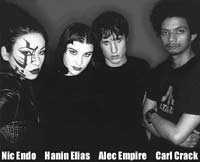In 1989 the Berlin Wall was torn down, uniting East (Communist) and West (Capitalist) Germany. This reunification brought new hopes for equality and prosperity to the people of Berlin, but by the early 1990s, these hopes were beginning to fade. Unification proved incapable of solving the numerous social, economic, and political problems facing Germany. The transition was rough and brought about economic instability and social turmoil. Capitalizing on the broken dreams of East and West German youth, nationalists and racists gained significant power during the post-wall years. Specifically, neo-nazis began to use the electronic music scene as a recruiting ground for disaffected German youth.
Rave / Techno culture which had replaced Punk as the dominant underground music culture lacked the energy and passion necessary to combat the highjacking of youth minds by an increasingly fascist status quo. Unlike Punk culture, Rave culture was actively apolitical ('no politics on the dance floor') and emphasized 'peace and unity' over freedom of expression. This led to a lethargic attitude surrounding critical social issues and made German youth culture an easy target for right wing extremists.
In the spring of 1992, Atari Teenage Riot was founded in reaction to the rise of neo-fascism within Germany's electronic music scene. Formed by Alec Empire, Hanin Elias, and Carl Crack, ATR combined the politics and aggressive attitude of Punk music with the electronic-equipment of Techno as well as lyrical elements of Hip-Hop. Atari Teenage Riot abandoned the heavy bass typical of techno and hip-hop in order to experiment with intentionally uncomfortable midrange frequencies. These frequencies created an agitating rather than pacifying ambiance which reflected the social tensions around which ATR was formed. Thus politics were incorporated not only into the lyrical elements of the band, but also into the music itself.
Atari Teenage Riot's first record, 'Hetzjagd Auf Nazis!' (Hunt Down the Nazis!), released in the autumn of 1992, was quickly banned from German clubs for its blatantly (and violently) political themes. Nevertheless, ATR's unique sound and proactive message received critical acclaim and became a quick success.
In 1993, Atari Teenage Riot signed a contract with a major European label, Phonogram, and took an extremely large cash advancement for the creation of a promised new record. But ATR had no intention of honoring the corporate contract and refused to create a serious record. Instead, band members wracked up huge bills in Phonogram's name, produced an outrageously uncommercial demo tape, and intentionally made themselves unwanted. That year ATR released two singles, 'Atari Teenage Riot' and 'Kids are United', but in the end Phonogram asked Alec, Hanin, and Carl to leave without making the promised album. Due to the wording of the contract, ATR was able to keep the large cash advancement. This money was then used to start an independent record label - Digital Hardcore Records.
In August of 1994, Atari Teenage Riot released a single entitled 'Raverbashing' which marked a final rejection of the Techno music scene as well as the use of prerecorded electronic noise. In 1995 ATR released their first full album, 'Delete Yourself', as well as another single 'Speed/Midijunkies'. 1996 saw the production of a further single, 'Sick to Death', and a second album, 'The Future of War'.
In order to reach an American audience, Atari Teenage Riot signed a deal with Grand Royal in late 1996. By 1997, Atari Teenage Riot had released their first album in the states, 'Burn Berlin, Burn!', which took the best tracks from both 'Delete Yourself!' and 'The Future of War'. While on tour, ATR added Nic Endo, an American, to the team as live support. Nic brought new layers of noise with her vocal attacks and was eventually held as a permanent fourth member of the band.
In 1999, Atari Teenage Riot pushed themselves even further with the production of '60 Second Wipeout'. Unlike previous albums, '60 Second Wipeout' was constructed entirely from samples created in ATR's own studio. Aided by Nic Endo's new energy, help from New York rappers The Arsonists, and riot-grrrl Kathleen Hanna, the album was an amazing success for the now internationally recognized band.
Throughout 1999, Atari Teenage Riot was constantly on the move doing shows, concerts, and clubs and always pushing the limits of musical integrity and human energy. On May 1, while ATR played at an anti-NATO rally in Berlin, police attacked crowds violently and demonstrators responded. Atari Teenage Riot continued playing as riots broke out in the streets to the tune of 'Revolution Action'. Alec Empire, Carl Crack, and Hanin Elias were arrested for 'inciting violence', but were later released and the charges were dropped due to the help of Anti-Fascist Action (AFA) lawyers.
As the touring wore on into late 1999, band members became increasingly ill of health due to the intensity of their performances. In October of 1999, a somewhat delirious Carl Crack was arrested after he attacked a flight attendant while attempting to exit an airplane during takeoff. Authorities pushed for Carl's admittance into a mental institution, claiming that his condition warranted professional intervention. Other members of Atari Teenage Riot, forced to continue touring without their companion, fought against Carl's detainment and eventually won his freedom.
By the late 90s, Atari Teenage Riot had become famous for intense, spontaneous, and unpredictable live shows during which the first priority had always been the music of the revolution (and not necessarily the fans). One such show at the end of 1999 was recorded and became Atari Teenage Riot's 2000 release - 'Live at Brixton Academy, 1999'. Angry at the increasingly mainstream and ideologically void nature of their own audiences, ATR unleashed their deadliest assault of noise attacks to date, infuriated many fans who didn't 'get it'. The album can only be described as pure and malevolent power-noise and serves as a reminder that ATR's true master is the music and not the masses.
Source: http://www.heliophobia.net/unsound/band_history.html
